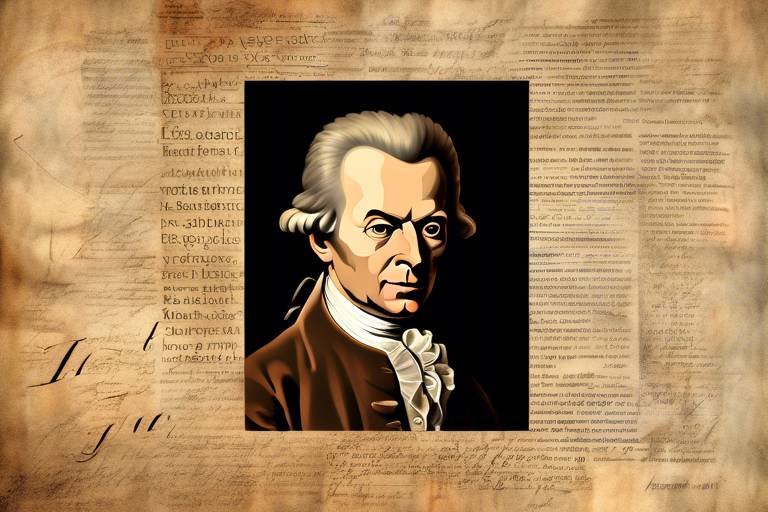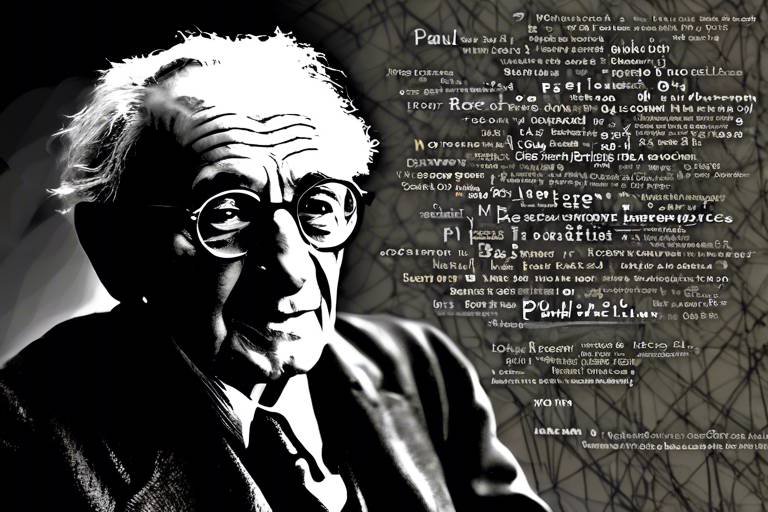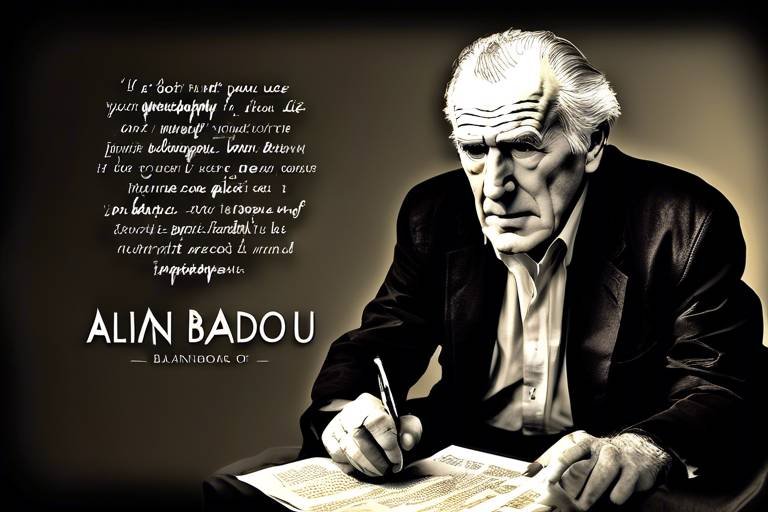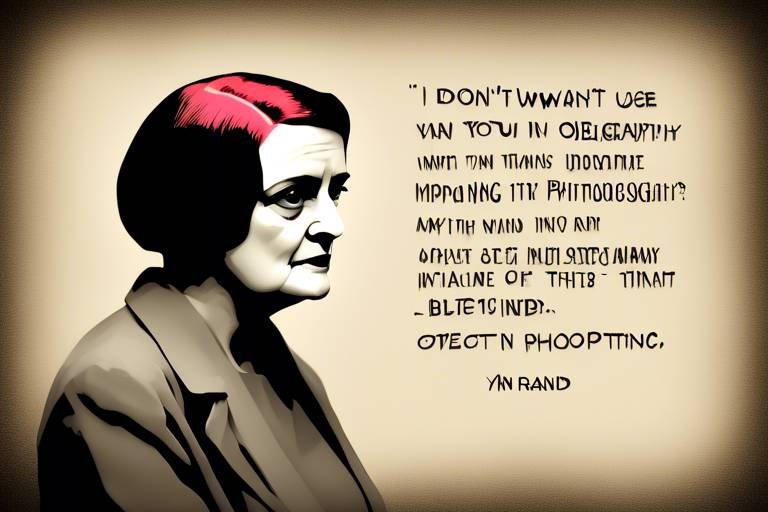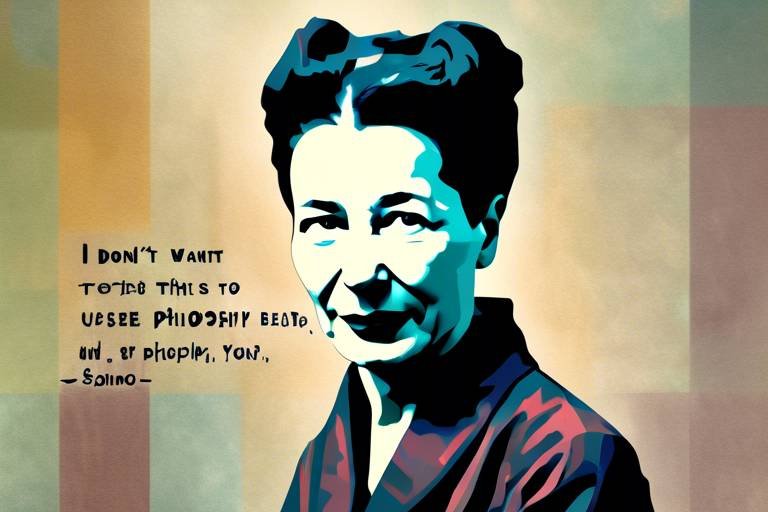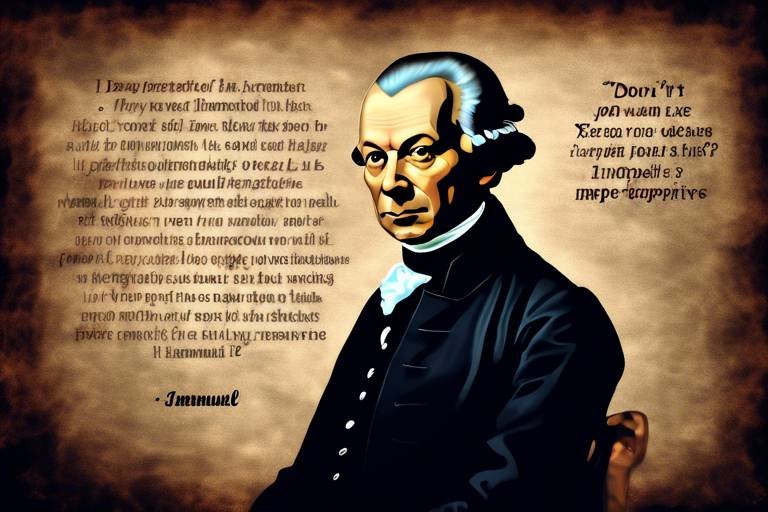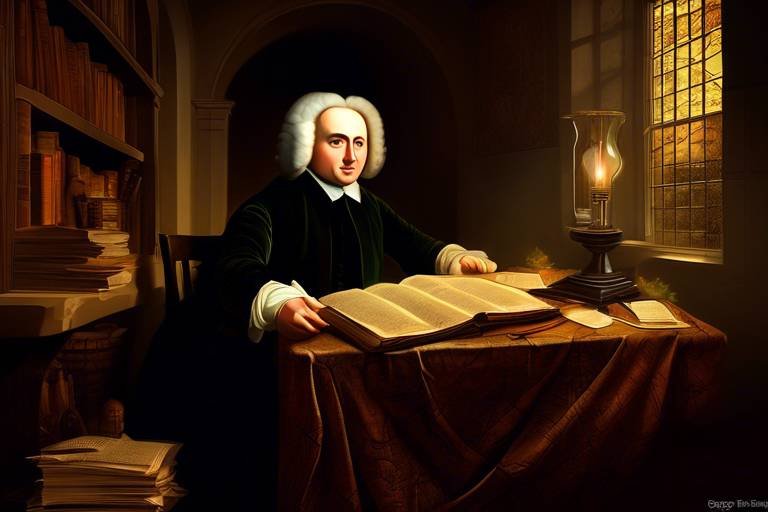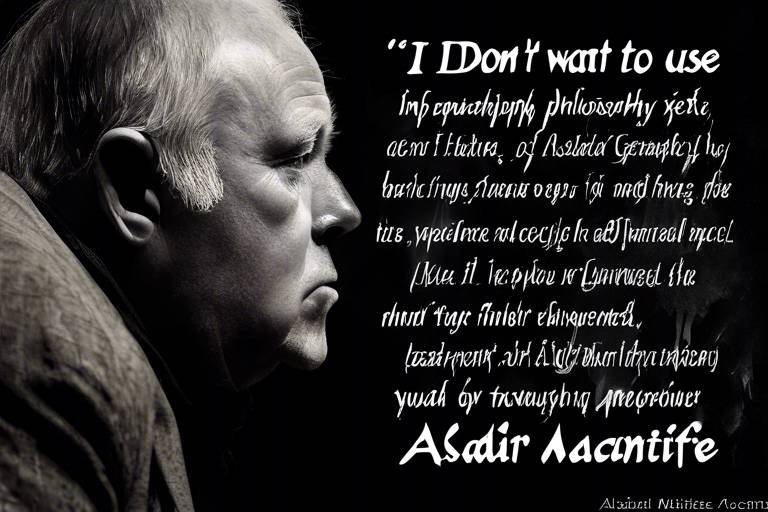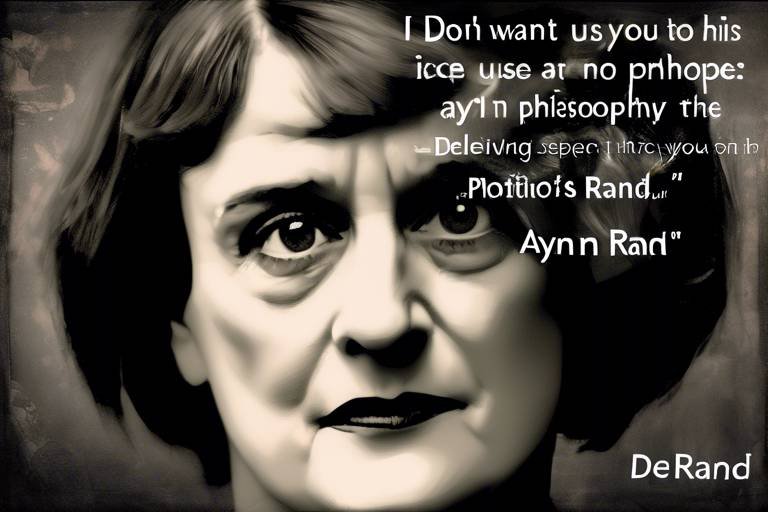Thoreau and the Philosophy of Transcendentalism
Henry David Thoreau, an iconic figure in American literature and philosophy, is best known for his profound contributions to the transcendentalist movement. This philosophical approach, which emerged in the early 19th century, emphasizes the inherent goodness of both people and nature. Thoreau's life and work encapsulate the essence of transcendentalism, advocating for a deep connection with the natural world, individuality, and self-reliance. His philosophy encourages us to break free from societal norms and materialistic pursuits, urging us to find meaning in simplicity and authenticity.
Thoreau's writings are not just reflections of his thoughts; they are invitations to explore our relationship with the environment and ourselves. He believed that by immersing ourselves in nature, we could unlock a deeper understanding of life and our place in the universe. This perspective is particularly relevant in today's fast-paced, technology-driven world, where many feel disconnected from nature and their true selves. Thoreau's call to embrace simplicity and introspection resonates now more than ever, as we navigate the complexities of modern life.
In essence, Thoreau's philosophy serves as a reminder that the answers we seek often lie within us and in the world around us. By fostering a relationship with nature and prioritizing self-discovery, we can cultivate a more meaningful existence. Let's delve deeper into Thoreau's life, his core beliefs, and the lasting impact of his ideas on contemporary society.
Thoreau was born on July 12, 1817, in Concord, Massachusetts. Growing up in a modest household, he was deeply influenced by his surroundings and the natural beauty of New England. His education at Harvard University was pivotal, exposing him to a variety of philosophical ideas and encouraging his intellectual curiosity. It was during this time that he began to develop his thoughts on nature, individuality, and the importance of living authentically.
After graduating, Thoreau worked as a teacher and later as a pencil maker, but his true passion lay in writing and natural observation. His famous experiment in simple living at Walden Pond, where he spent two years in a cabin he built himself, became the cornerstone of his philosophy. This experience allowed him to explore the themes of solitude, self-reliance, and the beauty of the natural world, which he later articulated in his seminal work, "Walden."
At the heart of transcendentalism lies the belief that individuals are inherently good and possess an innate connection to nature. Thoreau and his contemporaries, including Ralph Waldo Emerson, championed the idea of self-reliance, encouraging individuals to trust their intuition and insights rather than conforming to societal expectations. This philosophy challenges the status quo, urging us to seek truth and authenticity in our lives.
Transcendentalism also emphasizes the importance of nature as a source of inspiration and wisdom. Thoreau believed that spending time in the natural world could lead to profound personal revelations and a greater understanding of our place in the universe. By stepping away from the distractions of modern life and immersing ourselves in nature, we can reconnect with our true selves and gain clarity about our purpose.
For Thoreau, nature was not merely a backdrop for human existence; it was a vital teacher. He often wrote about the lessons that can be learned from observing the natural world. In his view, the cycles of nature reflect deeper truths about life, morality, and spirituality. Thoreau's reverence for nature is evident in his writings, where he often personifies elements of the natural world, highlighting their importance in our lives.
Solitude was another cornerstone of Thoreau's philosophy. He argued that spending time alone, particularly in nature, is essential for self-discovery and personal growth. In our busy lives, it can be easy to overlook the value of solitude, yet Thoreau believed that it is in these quiet moments that we can reflect on our thoughts, emotions, and aspirations. Solitude allows us to strip away the noise of society and connect with our inner selves.
Thoreau viewed nature as a reflection of a greater universal truth. He believed that by immersing ourselves in the natural world, we can connect with something larger than ourselves, transcending the limitations of our individual experiences. This connection fosters a sense of belonging and purpose, reminding us that we are part of a vast, interconnected web of life.
Thoreau's writings often critique societal norms and materialism. He urged individuals to question the expectations placed upon them by society and to pursue their authentic selves. In a world that often prioritizes wealth and status, Thoreau's philosophy promotes a life of purpose and meaning, encouraging us to seek fulfillment in experiences and relationships rather than possessions.
One of Thoreau's most influential essays, "Civil Disobedience," argues for the moral responsibility to resist unjust laws. He believed that individuals should prioritize their conscience over blind obedience to government authority. This essay has inspired countless social movements, advocating for justice and equality through peaceful resistance.
Thoreau's transcendentalist philosophy continues to resonate today, particularly within contemporary environmental movements. His emphasis on sustainability, simplicity, and a profound respect for nature serves as a guiding principle for those advocating for a more harmonious relationship with our planet.
Thoreau's ideas have left an indelible mark on various thinkers and writers, including Mahatma Gandhi and Martin Luther King Jr. His philosophy of nonviolent resistance and personal integrity has inspired generations in their pursuit of justice and equality, demonstrating the enduring power of his words.
- What is transcendentalism? - Transcendentalism is a philosophical movement that emphasizes the inherent goodness of people and nature, advocating for self-reliance and individual intuition.
- How did Thoreau influence environmentalism? - Thoreau's writings promote a deep respect for nature and simplicity, inspiring contemporary environmental movements focused on sustainability.
- What is the significance of "Civil Disobedience"? - Thoreau's essay argues for the moral obligation to resist unjust laws, influencing social movements advocating for justice and equality.

The Life of Henry David Thoreau
Henry David Thoreau, born on July 12, 1817, in Concord, Massachusetts, was a man whose life was intricately woven with the natural world and the philosophical currents of his time. Growing up in a modest family, Thoreau was deeply influenced by his surroundings and the rich landscapes of New England. His education at Harvard University, where he studied a variety of subjects including philosophy and science, laid the groundwork for his future explorations into the essence of life and nature. It was during these formative years that he began to cultivate a profound appreciation for simplicity and the beauty of the natural world.
Thoreau's experiences in nature were not just recreational; they were transformative. He often ventured into the woods, observing the changing seasons and the rhythms of life that unfolded around him. This connection to nature became a cornerstone of his philosophy. Thoreau famously spent two years living in a cabin he built near Walden Pond, an experiment in simple living that he later chronicled in his seminal work, Walden. In this book, he articulated his belief in the necessity of retreating from the chaos of society to find clarity and purpose.
Throughout his life, Thoreau was an advocate for individualism and self-reliance. He believed that true fulfillment could only be achieved by aligning oneself with nature and listening to one’s inner voice. His writings often reflect a deep-seated disdain for materialism and social conformity, as he urged his readers to pursue their own paths rather than blindly following societal expectations. Thoreau's philosophy was not merely theoretical; it was a call to action, encouraging individuals to live authentically and with intention.
In addition to his literary pursuits, Thoreau was an ardent naturalist. He meticulously documented the flora and fauna of his surroundings, contributing significantly to the field of ecology. His observations and reflections on nature were not only scientific but also deeply philosophical, as he sought to uncover the spiritual connections that bind humanity to the natural world. Thoreau's dual identity as a writer and naturalist enriched his work, allowing him to draw connections between the external environment and the internal landscape of the human experience.
Thoreau's life was also marked by his engagement with social issues. He was a vocal opponent of slavery and an advocate for civil rights. His essay Civil Disobedience emerged from his experiences with social injustice, particularly his protest against the Mexican-American War, which he viewed as an immoral act driven by expansionist greed. This work has since become a foundational text for movements advocating for social justice and nonviolent resistance.
In summary, Henry David Thoreau's life was a remarkable tapestry of philosophy, nature, and social advocacy. His experiences shaped his beliefs, leading him to become a pivotal figure in the transcendentalist movement. Through his writings and actions, Thoreau continues to inspire those who seek a deeper connection with nature and a more authentic way of living.
- What is Transcendentalism?
Transcendentalism is a philosophical movement that emphasizes the inherent goodness of people and nature, advocating for individual intuition and a deep connection with the natural world. - Why did Thoreau live at Walden Pond?
Thoreau lived at Walden Pond to experiment with simple living and to immerse himself in nature, seeking clarity and purpose away from societal distractions. - What is the significance of Thoreau's essay "Civil Disobedience"?
This essay argues for the moral responsibility to resist unjust laws and has influenced many social movements advocating for justice and individual conscience.

Core Principles of Transcendentalism
Transcendentalism, at its heart, is a **philosophical movement** that emerged in the early 19th century, primarily in New England. It revolves around the belief in the inherent goodness of both people and nature. Central to this philosophy is the idea that individuals can find truth through their own intuition and experiences rather than relying solely on established institutions or societal norms. This emphasis on **individuality** and **self-reliance** is what makes transcendentalism a refreshing perspective in a world often dominated by materialism and conformity.
One of the most compelling aspects of transcendentalism is its **celebration of nature**. Thoreau and his contemporaries viewed nature not merely as a backdrop for human activity but as a vital teacher and guide. They believed that spending time in the natural world fosters a deeper understanding of oneself and the universe. It’s almost like nature serves as a mirror, reflecting our inner truths and prompting us to confront our values and beliefs. This connection to nature is not just about enjoying its beauty; it's about recognizing our place within the larger tapestry of existence.
Furthermore, transcendentalism challenges the **status quo**, encouraging individuals to question societal expectations. It advocates for a life led by personal conviction rather than blind adherence to societal norms. This philosophy promotes a sense of **freedom**—the freedom to think, to feel, and to act in accordance with one's true self. In this sense, transcendentalism becomes a call to action, urging people to break free from the chains of conformity and to embrace their unique paths.
To summarize the core principles of transcendentalism, we can identify several key tenets:
- Inherent Goodness: Belief in the natural goodness of people and nature.
- Self-Reliance: Importance of individual intuition and personal judgment.
- Connection with Nature: Nature as a source of wisdom and inspiration.
- Critique of Materialism: Rejection of societal norms that prioritize material wealth over personal fulfillment.
In essence, transcendentalism encourages a **holistic view** of life, where the individual is seen as a vital part of a greater whole. It invites us to explore our relationship with the world around us, to seek meaning beyond the surface, and to cultivate a life that is rich in purpose and authenticity. Thoreau's writings serve as a powerful reminder of the importance of these principles, urging us to live deliberately and to connect with the profound truths that lie both within us and in the natural world.

Nature as a Teacher
Henry David Thoreau had a profound belief that nature is not just a backdrop to our lives, but rather a teacher that imparts invaluable lessons. Imagine walking through a forest, the sunlight filtering through the leaves, the sound of a gentle stream bubbling nearby. In moments like these, Thoreau argued, we can learn about life, morality, and our place in the universe. He saw nature as a living, breathing entity that communicates with us if we are willing to listen.
Thoreau's writings often reflect this deep reverence for nature. He believed that by immersing ourselves in the natural world, we can gain insights that are difficult to find amidst the noise and chaos of society. For instance, he pointed out that observing the changing seasons teaches us about impermanence and renewal. Just as winter gives way to spring, our lives too are filled with cycles of change, urging us to embrace the ebb and flow of existence.
Furthermore, Thoreau emphasized the idea that nature encourages self-reflection. When we step away from the distractions of modern life and find ourselves in a serene natural setting, we can engage in meaningful introspection. This solitude allows us to confront our thoughts and feelings, leading to a clearer understanding of our true selves. As he famously stated, “In the midst of this world, I can be alone.”
In his view, nature teaches us about interconnectedness. Every element in the ecosystem plays a vital role, from the tiniest insect to the tallest tree. This interconnectedness serves as a reminder that we, too, are part of something larger. Thoreau believed that recognizing our connection to the natural world fosters a sense of responsibility towards it. When we understand that our actions can impact the environment, we are more likely to act in ways that promote sustainability and harmony.
Thoreau's lessons from nature are not just philosophical musings; they are practical guides for living a fulfilling life. Here are some key teachings he derived from nature:
- Embrace Simplicity: Nature thrives on simplicity. Thoreau advocated for a simple life, free from the clutter of materialism.
- Practice Patience: Just as a seed takes time to grow into a mighty tree, personal growth requires patience and nurturing.
- Seek Authenticity: Nature is genuine and unpretentious. Thoreau encouraged individuals to be true to themselves and their values.
In conclusion, Thoreau's belief that nature is a teacher resonates deeply in today's fast-paced world. By taking the time to connect with the natural environment, we can uncover profound truths about ourselves and our place in the world. Nature, with its beauty and wisdom, beckons us to learn, grow, and live more authentically.
Q: What did Thoreau mean by saying nature is a teacher?
A: Thoreau believed that nature offers essential lessons about life, morality, and our interconnectedness with the world around us. By observing nature, we can learn about simplicity, patience, and authenticity.
Q: How can I connect with nature as Thoreau suggested?
You can connect with nature by spending time outdoors, whether it's hiking, gardening, or simply sitting in a park. Engage your senses and allow yourself to reflect on your experiences in nature.
Q: Why is solitude important in Thoreau's philosophy?
Solitude allows for self-discovery and personal growth. Thoreau argued that being alone in nature helps individuals gain clarity and a deeper understanding of themselves.

The Importance of Solitude
Solitude, in the eyes of Henry David Thoreau, is not merely the absence of company; it is a profound state of being that allows for deep self-reflection and personal growth. Imagine standing in a quiet forest, surrounded by towering trees and the gentle rustle of leaves. In that stillness, you can hear your own thoughts more clearly, as if nature itself is whispering secrets meant just for you. Thoreau believed that to truly understand oneself, one must embrace moments of solitude, stepping away from the chaos of society.
In his pivotal work, Walden, Thoreau famously wrote about his two years spent living in a cabin near Walden Pond. This experience was not just an experiment in simple living; it was a deliberate choice to seek solitude and clarity. He argued that in solitude, individuals can peel back the layers of societal expectations and discover their true selves. It’s like cleaning a dusty window to let the sunlight in—once the grime is removed, everything becomes clearer and more vibrant.
Thoreau posited that solitude fosters a deeper understanding of our place in the universe. When we are alone, we can contemplate our existence, our values, and our dreams without the noise of others' opinions clouding our judgment. This connection to our inner selves is vital for personal integrity and authenticity. In solitude, we can:
- Reflect on our life choices and aspirations.
- Reconnect with our natural instincts and intuition.
- Gain clarity on what truly matters to us.
Moreover, Thoreau emphasized that solitude is essential for creativity. Many artists and thinkers throughout history have retreated into solitude to find inspiration. When distractions are minimized, the mind can wander freely, exploring new ideas and concepts. It’s in these quiet moments that creativity often flourishes, much like a seed that needs the right conditions to sprout and grow.
However, embracing solitude can be challenging in a world that often values constant connectivity and social interaction. Thoreau's philosophy urges us to resist this societal pressure and instead cherish our alone time. By doing so, we not only enhance our understanding of ourselves but also cultivate a deeper appreciation for the world around us. Solitude, as Thoreau saw it, is not a retreat from life but a necessary component of a rich and meaningful existence.
In conclusion, the importance of solitude in Thoreau's philosophy cannot be overstated. It is a pathway to self-discovery, creativity, and a profound connection with nature. In a fast-paced world, taking the time to be alone, to think, and to reflect is not just beneficial; it is essential for a fulfilling life.
- Why is solitude important according to Thoreau?
Solitude is important because it allows individuals to reflect on their thoughts, gain clarity, and connect with their true selves away from societal distractions. - How did Thoreau practice solitude?
Thoreau practiced solitude by living in a cabin near Walden Pond for two years, where he immersed himself in nature and self-reflection. - Can solitude foster creativity?
Yes, solitude can foster creativity by providing a distraction-free environment where the mind can explore new ideas and thoughts.

Connection to the Universe
Henry David Thoreau had a profound understanding of the connection between humanity and the universe, viewing nature not merely as a backdrop for human activity but as an integral part of a larger cosmic tapestry. Thoreau believed that immersing ourselves in the natural world allows us to tap into deeper truths about existence. Just like a musician tuning their instrument to resonate with a symphony, he argued that we must align ourselves with the rhythms and patterns of nature to truly comprehend our place in the universe.
Thoreau often expressed that nature serves as a mirror, reflecting our inner thoughts and emotions. When we step outside and engage with the environment, we can see our struggles, joys, and fears mirrored back at us. This connection fosters a sense of unity with the world around us, allowing us to experience a profound sense of belonging. He famously stated, “In the wilderness is the preservation of the world,” suggesting that by understanding and respecting nature, we are also preserving our own humanity.
To Thoreau, the universe was not just a physical space; it was a spiritual one, filled with lessons waiting to be uncovered. He emphasized the importance of introspection and observation in nature, encouraging individuals to seek out those quiet moments that reveal the interconnectedness of all life. For instance, he noted that observing the changing seasons could teach us about the cycles of life and death, renewal and decay, thus enriching our understanding of existence.
In his journey to Walden Pond, Thoreau sought solitude to connect with the universe on a deeper level. This retreat was not just about escaping society; it was a deliberate attempt to strip away distractions and focus on what truly matters. By doing so, he discovered that the universe communicates through nature's beauty and complexity. Every rustling leaf, every ripple on the water, was a message waiting to be interpreted.
His philosophy encourages us to embrace the idea that we are all part of a larger whole. Just as a single star contributes to the brilliance of the night sky, each individual plays a role in the grand narrative of existence. Thoreau’s belief in a universal connection invites us to ponder our responsibilities toward each other and the environment. It challenges us to live authentically and in harmony with the world, fostering a deeper understanding of our interconnectedness.
As we reflect on Thoreau's insights, we can consider how modern society often distracts us from this connection. The fast pace of life, technology, and urbanization can create a disconnect from nature. Yet, Thoreau's teachings remind us that we can always return to the natural world to rediscover our place within it. By embracing moments of solitude in nature, we can reconnect with the universe and, in turn, with ourselves.
- What is the main idea behind Thoreau's connection to the universe? Thoreau believed that immersing ourselves in nature allows us to understand deeper truths about existence and our place in the cosmos.
- How did Thoreau view nature? He saw nature as a teacher and a reflection of our inner selves, providing essential lessons about life and interconnectedness.
- Why is solitude important in Thoreau's philosophy? Solitude allows for self-discovery and personal growth, enabling individuals to connect more deeply with nature and the universe.
- How can we apply Thoreau's ideas today? We can seek out moments of solitude in nature to reconnect with ourselves and the universe, fostering a sense of harmony and understanding.

Critique of Society
Henry David Thoreau, a keen observer of the world around him, often found himself at odds with the societal norms of his time. His writings are a passionate , where he challenges the status quo and urges individuals to break free from the shackles of conformity. Thoreau believed that society, with its relentless pursuit of material wealth and superficial values, often stifles the human spirit. He questioned the very foundation of societal expectations and norms, asking whether they truly serve the individual or merely perpetuate a cycle of mediocrity.
In his seminal work, Walden, Thoreau reflects on his two-year experiment of living simply in a cabin near Walden Pond. This period of introspection allowed him to witness the contrast between a life of simplicity and the chaos of modern society. He famously wrote, “The mass of men lead lives of quiet desperation.” This statement encapsulates his belief that many individuals are trapped in a societal framework that prioritizes wealth, status, and conformity over genuine happiness and self-fulfillment.
Thoreau's critique extends beyond mere observation; he actively encourages individuals to question societal norms. He believed that by doing so, one can discover their true self and purpose. He argued that materialism distracts us from the deeper, more meaningful aspects of life. Thoreau's philosophy advocates for a return to simplicity, suggesting that the less we own, the more we can appreciate the world around us. In this way, he challenges us to consider what we truly need to live a fulfilling life.
Moreover, Thoreau was not just a critic; he was a visionary. He envisioned a society where individuals could live authentically, guided by their own principles rather than societal pressures. He believed that true freedom comes from self-reliance and the courage to stand against the tide of public opinion. His famous quote, “Go confidently in the direction of your dreams! Live the life you have imagined,” serves as a rallying cry for those willing to pursue their passions and ideals, regardless of societal expectations.
Thoreau's critique of society also highlights the dangers of complacency. He warned against the passive acceptance of unjust laws and practices, urging individuals to take a stand. He believed that the moral conscience of a society is only as strong as its individuals. This perspective foreshadows his later work, Civil Disobedience, where he argues for the necessity of resisting unjust laws and government actions. Thoreau’s philosophy encourages us to engage actively with the world, to question authority, and to seek justice.
In conclusion, Thoreau's critique of society is not merely a condemnation of the existing state of affairs; it is an invitation to explore the depths of our own consciousness. He challenges us to live authentically, to embrace our individuality, and to resist the pressures of conformity. By doing so, we can create a life rich in meaning and purpose, ultimately leading to a more just and compassionate society.
- What is Transcendentalism?
Transcendentalism is a philosophical movement that emphasizes the inherent goodness of people and nature, advocating for self-reliance and individual intuition.
- How did Thoreau influence modern society?
Thoreau's ideas on simplicity and civil disobedience have inspired numerous social movements and continue to resonate in contemporary discussions about environmentalism and social justice.
- What is the significance of solitude in Thoreau's philosophy?
Thoreau believed that solitude is essential for self-discovery and personal growth, allowing individuals to connect deeply with their thoughts and the natural world.

Civil Disobedience
Henry David Thoreau's essay, , stands as a powerful testament to the idea that individuals have a moral obligation to resist unjust laws. Written in 1849, this seminal work emerged from Thoreau's own experiences with government injustice, particularly his opposition to slavery and the Mexican-American War. Thoreau famously spent a night in jail for refusing to pay a poll tax that funded these injustices, an act of defiance that sparked his philosophical musings on the relationship between the individual and the state.
In , Thoreau argues that when the government is unjust, it is not only the right but the duty of citizens to resist and refuse compliance. He believed that true justice comes from within, and that individuals should follow their own conscience rather than blindly adhere to laws that perpetuate wrongdoing. This notion of personal integrity over societal conformity resonates deeply, as it encourages people to evaluate the morality of their actions and the systems governing them.
Thoreau’s philosophy can be distilled into a few key principles:
- Individual Conscience: Thoreau emphasizes that each person must act according to their own moral compass, even if it means standing against the majority.
- Nonviolent Resistance: He advocates for peaceful forms of protest as a means of expressing dissent, which has influenced many social movements throughout history.
- Critique of Government: Thoreau urges individuals to question the legitimacy of government actions and laws, particularly those that infringe upon human rights.
His call to action has inspired countless activists and movements, from the civil rights movement led by Martin Luther King Jr. to the nonviolent resistance of Mahatma Gandhi. Both leaders drew heavily from Thoreau's principles, demonstrating that the fight for justice often requires courage and a willingness to challenge the status quo.
Today, Thoreau's ideas remain relevant as we navigate complex social and political landscapes. In an era where many feel disillusioned by governmental authority, his message serves as a reminder that individuals possess the power to effect change. Whether through protest, advocacy, or simply refusing to comply with unjust laws, Thoreau's legacy lives on in the hearts of those who dare to stand up for what is right.
- What is the main idea of Thoreau's Civil Disobedience?
Thoreau argues that individuals have a moral responsibility to resist unjust laws and prioritize their conscience over compliance with government mandates. - How did Thoreau's experiences influence his writing?
Thoreau’s personal encounters with government injustice, particularly his imprisonment for refusing to pay taxes, inspired him to articulate his philosophy of civil disobedience. - Who were some notable figures influenced by Thoreau?
Thoreau's philosophy has inspired many, including Mahatma Gandhi and Martin Luther King Jr., who applied his principles of nonviolent resistance in their own struggles for justice.

Civil Disobedience
Thoreau's upbringing and education shaped his philosophical outlook, leading him to become a prominent writer and naturalist. His experiences in nature profoundly influenced his thoughts on simplicity and society.
Transcendentalism emphasizes the inherent goodness of people and nature. It advocates for self-reliance, individual intuition, and a deep connection with the natural world, challenging societal norms and materialism.
Thoreau believed that nature provides essential lessons about life, morality, and spirituality. His writings often reflect a reverence for the natural world as a source of wisdom and inspiration.
In Thoreau's philosophy, solitude is crucial for self-discovery and personal growth. He argued that spending time alone in nature fosters deeper understanding and clarity of thought.
Thoreau viewed nature as a reflection of a greater universal truth. He believed that by immersing ourselves in nature, we can connect with something larger than ourselves.
Thoreau's writings often critique societal norms, materialism, and conformity. He urged individuals to question societal expectations and pursue their authentic selves, promoting a life of purpose and meaning.
Thoreau's essay is a powerful argument for the moral responsibility of individuals to resist unjust laws. He believed that when a law is unjust, it is not only the right but the duty of the individual to stand against it. Thoreau famously stated, "That government is best which governs least," emphasizing that excessive government control often leads to the oppression of individual freedoms. His philosophy encourages people to prioritize their conscience over blind obedience to authority, urging them to think critically about the laws they follow.
In his essay, Thoreau outlined several key principles that underline his argument:
- Individual Conscience: Thoreau believed that each person has an internal moral compass that should guide their actions, especially in the face of injustice.
- Nonviolent Resistance: He advocated for peaceful protest as a means of opposing unjust laws, laying the groundwork for future civil rights movements.
- Personal Integrity: Thoreau emphasized the importance of living authentically and aligning one’s actions with their beliefs, even if it means facing societal backlash.
This essay has had a profound impact on various social movements throughout history, inspiring leaders like Mahatma Gandhi and Martin Luther King Jr. to adopt similar philosophies of nonviolent resistance. Thoreau’s ideas challenge us to reflect on our own roles in society and question the morality of the laws we are asked to follow.
Thoreau's transcendentalist philosophy continues to inspire contemporary environmental movements, emphasizing sustainability, simplicity, and a profound respect for nature in today's society.
Thoreau's ideas have significantly impacted various thinkers and writers, including Mahatma Gandhi and Martin Luther King Jr., promoting nonviolent resistance and personal integrity in the pursuit of justice.
1. What is the main idea of Thoreau's Civil Disobedience?
Thoreau's main idea in is that individuals have a moral obligation to resist unjust laws and government actions. He argues that true justice comes from following one's conscience rather than blindly obeying authority.
2. How did Thoreau's philosophy influence social movements?
Thoreau's philosophy of nonviolent resistance inspired many leaders, including Gandhi and Martin Luther King Jr., who applied his principles in their struggles for civil rights and social justice.
3. Why is solitude important in Thoreau's philosophy?
Solitude is essential in Thoreau's philosophy as it allows individuals to reflect, connect with nature, and gain a deeper understanding of themselves and their beliefs.

argues for the moral responsibility to resist unjust laws. His philosophy influenced social movements, advocating for individual conscience over blind obedience to government.
Henry David Thoreau's essay Civil Disobedience is a powerful manifesto that argues for the moral responsibility of individuals to resist unjust laws. Thoreau believed that when laws are unjust, it is not only the right but the duty of citizens to stand against them. This idea was revolutionary in its time and remains profoundly relevant today. He famously stated that "the only obligation which I have a right to assume is to do at any time what I think right." This statement encapsulates the essence of his philosophy, which prioritizes individual conscience over blind obedience to government.
Thoreau's argument is grounded in the belief that government should serve the people and uphold justice. When it fails to do so, it loses its legitimacy. He contended that individuals must not allow their moral compass to be dictated by laws that perpetuate injustice. This stance challenges the status quo and encourages people to think critically about the laws they follow. Thoreau's call to action is not just about passive resistance but active engagement in the pursuit of justice, urging individuals to take a stand against wrongdoing, even if it means facing legal consequences.
His philosophy of civil disobedience has had a profound impact on various social movements throughout history. It has inspired countless activists to challenge oppressive systems and advocate for change. Here are a few key movements influenced by Thoreau's ideas:
- The Civil Rights Movement: Leaders like Martin Luther King Jr. drew heavily from Thoreau's principles, promoting nonviolent resistance against segregation and discrimination.
- Anti-War Protests: Thoreau's views on government overreach resonated with those opposing the Vietnam War, emphasizing the need for individual action against unjust military actions.
- Environmental Movements: Activists advocating for ecological justice often cite Thoreau’s reverence for nature and the moral imperative to protect the environment from exploitation.
Thoreau's insistence on following one's conscience over societal expectations resonates deeply in today's world, where many face moral dilemmas regarding compliance with laws that may be unjust or harmful. His ideas encourage individuals to engage in thoughtful reflection and to act according to their beliefs, fostering a society where justice prevails over mere legality.
- What is the main idea of Thoreau's Civil Disobedience? Thoreau argues that individuals have a moral responsibility to resist unjust laws and not blindly follow government mandates.
- How did Thoreau's philosophy influence social movements? His ideas inspired leaders like Gandhi and Martin Luther King Jr. to advocate for nonviolent resistance and social justice.
- Why is civil disobedience important today? It encourages individuals to question and challenge unjust laws, promoting a more just and equitable society.

Legacy of Thoreau's Ideas
Henry David Thoreau's legacy is a vibrant tapestry woven from threads of nature, individualism, and social justice. His thoughts and writings have transcended time, inspiring countless movements and individuals to embrace a lifestyle that prioritizes authenticity and a deep connection to the natural world. Thoreau's philosophy encourages us to step back from the chaos of modern life and reflect on what truly matters. But what does this legacy look like in today's context?
One of the most significant impacts of Thoreau's ideas can be seen in the contemporary environmental movement. His profound respect for nature and advocacy for simplicity resonate strongly in an age where consumerism and environmental degradation are rampant. Activists today often reference his work, particularly his famous book, Walden, as a source of inspiration for sustainable living and conservation efforts. Thoreau's belief that we can find peace and clarity by immersing ourselves in nature is a powerful call to action for those seeking to combat climate change and promote ecological awareness.
Moreover, Thoreau's emphasis on individual conscience has left an indelible mark on social justice movements. His essay, Civil Disobedience, argues that individuals have a moral duty to resist unjust laws and systems. This notion has inspired leaders like Mahatma Gandhi and Martin Luther King Jr., who adopted his principles of nonviolent resistance in their struggles for justice and equality. Thoreau’s legacy is a reminder that standing up for one’s beliefs, even in the face of adversity, is a vital part of being human.
Thoreau's ideas also encourage a critical examination of societal norms. In a world that often prioritizes material wealth and conformity, his philosophy challenges us to question the status quo and seek a life that aligns with our true selves. This introspective journey is not merely a personal endeavor; it has the potential to transform communities and societies. By fostering a culture of self-reliance and authenticity, we can create spaces where individuals feel empowered to express their unique identities and contribute positively to the world around them.
In essence, the legacy of Thoreau's ideas is not just about the past; it's a living, breathing philosophy that continues to inspire and challenge us today. Whether it’s through environmental activism, social justice movements, or personal introspection, Thoreau’s thoughts serve as a guiding light, urging us to reconnect with nature, embrace our individuality, and strive for a just and meaningful existence. As we navigate the complexities of modern life, we would do well to remember Thoreau's words and the profound wisdom they hold.
- What is the main idea of Thoreau's philosophy? Thoreau's philosophy emphasizes the importance of nature, individuality, and self-reliance, advocating for a life that is in harmony with the natural world.
- How did Thoreau influence environmental movements? Thoreau's writings, especially Walden, inspire environmentalists to promote sustainability and a deeper connection to nature.
- What is the significance of Civil Disobedience? In this essay, Thoreau argues that individuals have a moral responsibility to resist unjust laws, influencing leaders like Gandhi and King.
- How can Thoreau's ideas be applied today? Thoreau's ideas encourage us to question societal norms, embrace our individuality, and strive for a more meaningful and sustainable life.

Influence on Future Thinkers
Henry David Thoreau's profound ideas have not only shaped the transcendentalist movement but have also left an indelible mark on numerous thinkers and activists across generations. His emphasis on individual conscience and the importance of nonconformity resonate deeply with those who seek to challenge the status quo. For instance, Mahatma Gandhi famously drew inspiration from Thoreau's essay, Civil Disobedience, utilizing the principles of nonviolent resistance to fight against British colonial rule in India. Gandhi's approach to social change was rooted in Thoreau's belief that individuals have a moral obligation to resist unjust laws, which he articulated through peaceful protests and civil disobedience.
Similarly, Martin Luther King Jr. found Thoreau's philosophy to be a guiding light in his own struggle for civil rights in the United States. King's commitment to justice and equality was heavily influenced by Thoreau's insistence on acting according to one's conscience, even in the face of oppressive societal norms. In his famous "Letter from Birmingham Jail," King references Thoreau's ideas to justify his actions against segregation and discrimination, emphasizing that injustice anywhere is a threat to justice everywhere.
Moreover, Thoreau's thoughts on nature and simplicity have inspired countless environmentalists and writers who advocate for a sustainable future. The modern environmental movement can trace its roots back to Thoreau's belief in the intrinsic value of nature and the necessity of preserving it for future generations. His call for a deep connection with the natural world challenges us to reconsider our relationship with the environment and promotes a lifestyle that prioritizes sustainability and mindfulness.
In contemporary society, Thoreau's legacy continues to inspire activists and thinkers who seek to promote social justice, environmental stewardship, and personal integrity. His ideas encourage individuals to look within themselves, question societal norms, and embrace their unique paths. This enduring influence is a testament to the power of Thoreau's vision, reminding us that true change begins with the courage to stand up for what is right, even when it goes against the grain.
- What is transcendentalism? Transcendentalism is a philosophical movement that emphasizes the inherent goodness of people and nature, advocating for self-reliance and individual intuition.
- How did Thoreau influence civil rights movements? Thoreau's essay on civil disobedience inspired leaders like Martin Luther King Jr. and Mahatma Gandhi to adopt nonviolent resistance in their struggles for justice.
- Why is solitude important in Thoreau's philosophy? Thoreau believed that solitude fosters self-discovery and personal growth, allowing individuals to connect more deeply with their thoughts and the natural world.
- What lessons can we learn from Thoreau's connection to nature? Thoreau teaches us to appreciate nature's wisdom and to live simply, reminding us that our well-being is intertwined with the health of the environment.
Frequently Asked Questions
- What is Transcendentalism?
Transcendentalism is a philosophical movement that emerged in the early 19th century, emphasizing the inherent goodness of people and nature. It encourages individuals to rely on their intuition and connect deeply with the natural world, challenging societal norms and materialistic values.
- Who was Henry David Thoreau?
Henry David Thoreau was an American writer, philosopher, and naturalist, best known for his book "Walden," which reflects his beliefs in simplicity and self-reliance. Thoreau was a key figure in the transcendentalist movement and used his experiences in nature to explore profound philosophical ideas.
- What role does nature play in Thoreau's philosophy?
For Thoreau, nature is not just a backdrop; it's a vital teacher. He believed that spending time in nature fosters personal growth and self-discovery, offering essential lessons about life, morality, and spirituality. Thoreau saw nature as a source of wisdom that can guide individuals toward a deeper understanding of themselves and the universe.
- How did Thoreau view solitude?
Thoreau considered solitude as essential for self-discovery. He argued that time spent alone in nature allows for clarity of thought and deeper introspection, enabling individuals to connect with their true selves away from societal distractions.
- What is the significance of 'Civil Disobedience'?
In his essay "Civil Disobedience," Thoreau advocates for the moral responsibility to resist unjust laws. He argues that individuals should prioritize their conscience over blind obedience to the government, influencing future social movements and promoting the idea of nonviolent resistance.
- How has Thoreau's philosophy influenced modern environmental movements?
Thoreau's transcendentalist ideas have left a lasting legacy on contemporary environmentalism. His emphasis on sustainability, respect for nature, and simplicity resonates with today's movements that advocate for a more harmonious relationship between humanity and the natural world.
- Who are some notable figures influenced by Thoreau?
Thoreau's ideas have inspired many influential figures, including Mahatma Gandhi and Martin Luther King Jr. His philosophy of nonviolent resistance and personal integrity has had a profound impact on social justice movements around the world.


